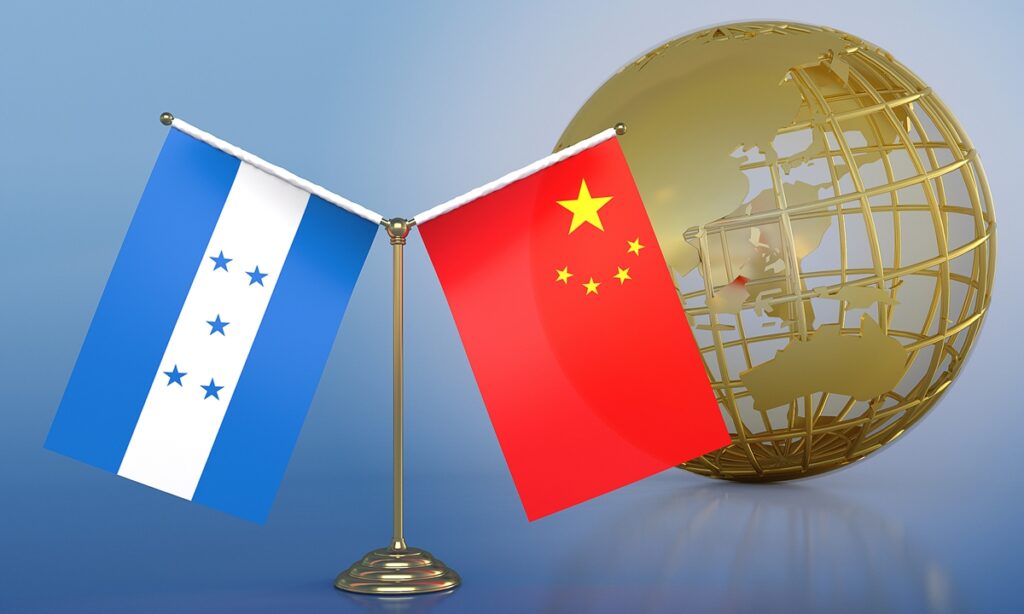China and Honduras on Tuesday announced the official launch of the negotiations on a bilateral free trade agreement (FTA), just three months after the two countries established diplomatic ties in March and less than one month after Honduran President made a historical visit to China, demonstrating that bilateral practical cooperation is deepening.
The launch of China-Honduras FTA negotiations, which was jointly announced by Chinese Minister of Commerce Wang Wentao and Honduran Minister of Economic Development Fredis Cerrato, is conducive to deepening practical cooperation in economic and trade fields between the two countries, providing impetus for further upgrading the quality and level of bilateral trade and strengthening investment and cooperation in various fields, read a statement by China’s Ministry of Commerce on Tuesday.
China’s Ministry of Foreign Affairs also said on Tuesday that launching FTA negotiations “is an important common understanding reached between the two heads of state during Honduran President Xiomara Castro’s visit to China, and it fully demonstrates the willingness of the two sides to deepen practical cooperation.”
It is hoped that the FTA negotiations can be concluded within a year, Melvin Redondo, the deputy minister of economic development of Honduras said in June at the First China-Honduras High-Level Entrepreneur Exchange Conference.
Prior to the FTA negotiations, the two countries on June 12 signed a cooperation document on jointly building the China-proposed Belt and Road Initiative.
Analysts said that such a fast pace is unprecedented in China’s relations with Latin American countries.
The promotion of practical cooperation between China and Honduras will set an example and push forward the FTA negotiation process between China and other Latin American countries, Wu Hongying, director of the Institute of Regional and International Studies at Hubei University, told the Global Times on Tuesday.
“So far, China has signed FTAs with four Latin American countries ¬- Chile, Peru, Costa Rica and Ecuador – with more to come,” said Wu.
She noted that accelerating economic and trade cooperation with China can bolster Honduras’ economy, as the Honduran economy is dominated by agriculture, with a weak industrial base and a long dependence on agricultural exports such as coffee and bananas.
In mid-June, Honduran whiteleg shrimps, fresh bananas and unroasted coffee beans were allowed to enter the Chinese market, the General Administration of Customs of China (GAC) announced in several notices.
The bilateral trade between China and Honduras stood at $740.7 million from January to May in 2023, up 14.9 percent year-on-year. China’s imports from Honduras totaled $39.9 million, up 193.9 percent year-on-year, according to statistics from GAC.
Trade between China and Honduras and other Latin American countries is highly complementary. Honduras mainly exports minerals and agricultural products, which are also the main trade products between China and Latin American countries, and China has a huge demand for these products, Zhou Zhiwei, an expert on Latin American studies at the Chinese Academy of Social Sciences, told the Global Times on Tuesday.
“The growing economic and trade cooperation between China and Latin America is an obvious trend,” Zhou noted.
For Chinese businessmen, the economic and trade exchanges between the two countries will become more and more convenient, which is conducive to exploring the markets of both sides, Xie Zuoqi, a representative from the Association of Fujian in Honduras, told the Global Times on Tuesday.
“The launch of the FTA negotiations will encourage Chinese businessmen to increase local investment and expand cooperation in trade, energy, mining, civil infrastructure, logistics, internet innovation and e-commerce,” said Xie.
(Global Times)




